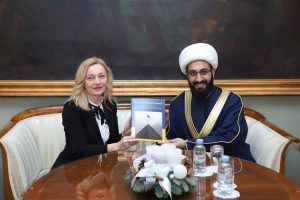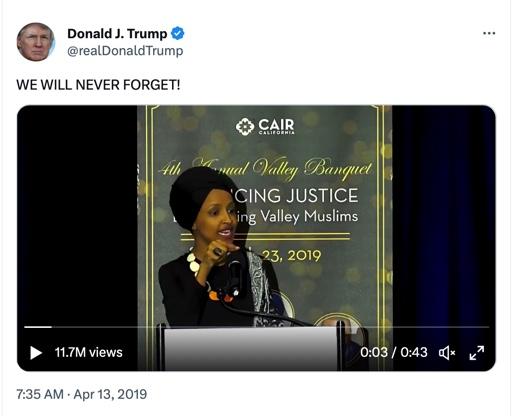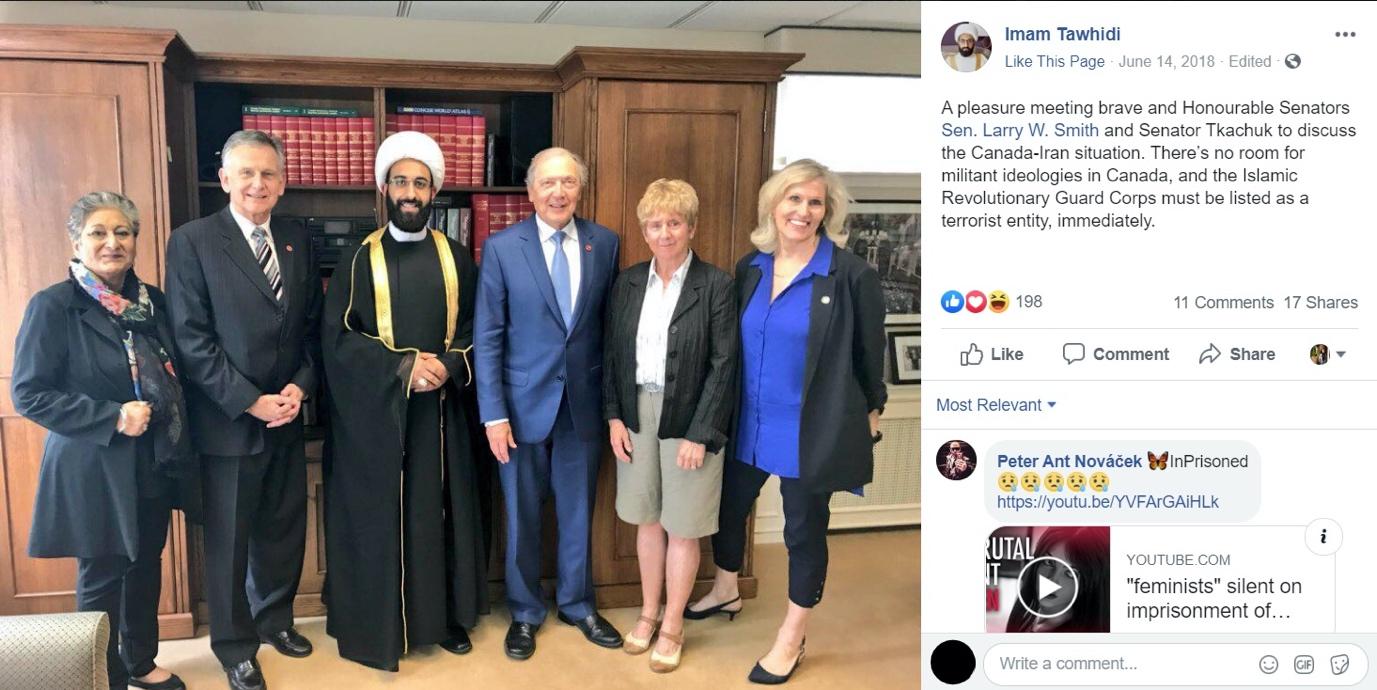In 2017, the imam was exposed as a fraud. But six years on, Mohammad Tawhidi is seeing an explosion in his popularity and prestige abroad – particularly in the U.S.
By Joanna Psaros
March 09, 2023

Imam Mohammad Tawhidi poses for a photo with Croatian MP Marijana Petir, Dec. 12, 2022.
Credit: Croatian ParliamentADVERTISEMENT
On May 23, 2017, Australians awoke to the shocking news of a suicide bombing taking place at a pop concert in Manchester, England. The attack, for which Islamic State would later claim responsibility, was carried out by a 22-year-old British citizen of Libyan descent using homemade explosives. Twenty-two people were killed, including a number of children.
Coverage of the story dominated world media, including breakfast television program “Sunrise,” which two days later aired a special broadcast with the headline “Manchester Terror: Australia’s Muslim leaders speak out.” One leader interviewed was Imam Mohammad Tawhidi.
“We have a large number of youth that are being radicalized,” Tawhidi said gravely, clad in flowing black robes and a turban-like head covering.
“This happens because of the books we have, the Islamic scriptures that we have. They push the Muslim youth to believe that if you go out there and you kill the infidel, that’s how you will gain paradise.”
For the imam (a word connoting Islamic spiritual leadership), this was far from his first foray into the media spotlight – nor would it be his last. In his capacity as leader of the Islamic Association of South Australia, Tawhidi became somewhat of a regular fixture in Australia’s center-right circuit, making multiple appearances on “The Bolt Report,” “Ben Fordham Live,” “Today Tonight,” and “A Current Affair,” and with nationwide publications from The Daily Mail to The Australian providing additional coverage of his controversial views on Muslim immigration and the dangers of Islamic schools.
No mean feat, given his credentials were almost entirely fabricated.
Tawhidi’s tenuous credibility as a spokesperson for Australia’s Muslim community began to crumble with a series of ABC investigations into his background. A June 2017 article, titled “Imam Mohammad Tawhidi: The problem with the media’s favourite Muslim,” revealed that the self-proclaimed imam had no mosque, was not recognized by the Australian National Imams Council, and never graduated from the Iranian university at which he claimed to have completed a master’s degree in Islamic theology.
Doubt was also cast on Tawhidi’s ostentatious story of being forced into hiding and receiving police protection after a threat of beheading was allegedly posted on his Facebook page.
Australia’s love affair with the outspoken imam soon came to an end. For the past few years, local media coverage of Tawhidi’s activities has been confined to a handful of less than flattering profiles on his legal troubles (last year saw Tawhidi successfully sued for defamation after calling a Melbourne immigration lawyer an “ISIS promoter”).
But in a bizarre twist, Mohammad Tawhidi’s cancellation in Australia appears to have directly coincided with an explosion in his popularity and prestige abroad – particularly in the United States, Israel, and certain Arab Gulf states. In a world of “fake news,” it seems that clickbait trumps facts. And when it comes to clickbait, nothing trumps Trump.
At the time of writing, Tawhidi boasts a Twitter following of 809,300 – a number that dwarfs Prime Minister Anthony Albanese’s 625,400 and includes high-profile U.S. Republicans, including Ellie Cohanim, Nikki Haley, Brian E. Leib, and Donald Trump Jr. And while former U.S. President Donald J. Trump does not currently follow Tawhidi, there’s evidence that Australia’s former favorite imam has successfully influenced the man himself.
From his proposed ban on Muslim immigration to labeling Black Lives Matter protesters “thugs,” Trump’s presidency was characterized by social media scandals and racially charged unrest. But accusations of Islamophobia against Trump reached a peak in April 2019 after the then-president posted a doctored video of Democrat Ilhan Omar speaking at the Council of American-Islamic Relations (CAIR) the previous month – endangering the life of the congresswoman in the process.
“WE WILL NEVER FORGET!” Trump captioned the clip, which depicts Omar stating “CAIR was founded after 9/11, because they recognized some people did something.”
The video then splices between graphic footage of the Twin Towers collapsing taken from various news channels. The words “SOME PEOPLE DID SOMETHING?” are repeated in bold on a plain black background.

Omar’s speech was intended to highlight the perceived injustice of the United States’ treatment of its moderate Muslim community in the wake of 9/11. Her full quote is: “[CAIR] recognized that some people did something, and that all of us were starting to lose access to our civil liberties.” But the damage had been done.
Ilhan Omar, who is a Muslim American, released a statement alleging she received an increased number of death threats in the days following this tweet. Trump would later instigate further online attacks against the representative in a similar vein, including the erroneous accusation that Omar was “out partying” on the night of September 11. Later, a New York man was arrested and charged with threatening to assault and murder her; the accused was reportedly a hard-line Trump supporter.
In June 2019, an article was published by The Intercept concerning the origins of Trump’s infamous tweet. The article alleged that a video the same or similar to the one posted by Trump actually originated from the Twitter account of Mohammad Tawhidi (the post has now been removed), before being re-tweeted by Republican Dan Crenshaw, and eventually coming to the attention of Trump himself.
On May 23, 2017, Australians awoke to the shocking news of a suicide bombing taking place at a pop concert in Manchester, England. The attack, for which Islamic State would later claim responsibility, was carried out by a 22-year-old British citizen of Libyan descent using homemade explosives. Twenty-two people were killed, including a number of children.
Coverage of the story dominated world media, including breakfast television program “Sunrise,” which two days later aired a special broadcast with the headline “Manchester Terror: Australia’s Muslim leaders speak out.” One leader interviewed was Imam Mohammad Tawhidi.
“We have a large number of youth that are being radicalized,” Tawhidi said gravely, clad in flowing black robes and a turban-like head covering.
“This happens because of the books we have, the Islamic scriptures that we have. They push the Muslim youth to believe that if you go out there and you kill the infidel, that’s how you will gain paradise.”
For the imam (a word connoting Islamic spiritual leadership), this was far from his first foray into the media spotlight – nor would it be his last. In his capacity as leader of the Islamic Association of South Australia, Tawhidi became somewhat of a regular fixture in Australia’s center-right circuit, making multiple appearances on “The Bolt Report,” “Ben Fordham Live,” “Today Tonight,” and “A Current Affair,” and with nationwide publications from The Daily Mail to The Australian providing additional coverage of his controversial views on Muslim immigration and the dangers of Islamic schools.
No mean feat, given his credentials were almost entirely fabricated.
Tawhidi’s tenuous credibility as a spokesperson for Australia’s Muslim community began to crumble with a series of ABC investigations into his background. A June 2017 article, titled “Imam Mohammad Tawhidi: The problem with the media’s favourite Muslim,” revealed that the self-proclaimed imam had no mosque, was not recognized by the Australian National Imams Council, and never graduated from the Iranian university at which he claimed to have completed a master’s degree in Islamic theology.
Doubt was also cast on Tawhidi’s ostentatious story of being forced into hiding and receiving police protection after a threat of beheading was allegedly posted on his Facebook page.
Australia’s love affair with the outspoken imam soon came to an end. For the past few years, local media coverage of Tawhidi’s activities has been confined to a handful of less than flattering profiles on his legal troubles (last year saw Tawhidi successfully sued for defamation after calling a Melbourne immigration lawyer an “ISIS promoter”).
But in a bizarre twist, Mohammad Tawhidi’s cancellation in Australia appears to have directly coincided with an explosion in his popularity and prestige abroad – particularly in the United States, Israel, and certain Arab Gulf states. In a world of “fake news,” it seems that clickbait trumps facts. And when it comes to clickbait, nothing trumps Trump.
At the time of writing, Tawhidi boasts a Twitter following of 809,300 – a number that dwarfs Prime Minister Anthony Albanese’s 625,400 and includes high-profile U.S. Republicans, including Ellie Cohanim, Nikki Haley, Brian E. Leib, and Donald Trump Jr. And while former U.S. President Donald J. Trump does not currently follow Tawhidi, there’s evidence that Australia’s former favorite imam has successfully influenced the man himself.
From his proposed ban on Muslim immigration to labeling Black Lives Matter protesters “thugs,” Trump’s presidency was characterized by social media scandals and racially charged unrest. But accusations of Islamophobia against Trump reached a peak in April 2019 after the then-president posted a doctored video of Democrat Ilhan Omar speaking at the Council of American-Islamic Relations (CAIR) the previous month – endangering the life of the congresswoman in the process.
“WE WILL NEVER FORGET!” Trump captioned the clip, which depicts Omar stating “CAIR was founded after 9/11, because they recognized some people did something.”
The video then splices between graphic footage of the Twin Towers collapsing taken from various news channels. The words “SOME PEOPLE DID SOMETHING?” are repeated in bold on a plain black background.

Omar’s speech was intended to highlight the perceived injustice of the United States’ treatment of its moderate Muslim community in the wake of 9/11. Her full quote is: “[CAIR] recognized that some people did something, and that all of us were starting to lose access to our civil liberties.” But the damage had been done.
Ilhan Omar, who is a Muslim American, released a statement alleging she received an increased number of death threats in the days following this tweet. Trump would later instigate further online attacks against the representative in a similar vein, including the erroneous accusation that Omar was “out partying” on the night of September 11. Later, a New York man was arrested and charged with threatening to assault and murder her; the accused was reportedly a hard-line Trump supporter.
In June 2019, an article was published by The Intercept concerning the origins of Trump’s infamous tweet. The article alleged that a video the same or similar to the one posted by Trump actually originated from the Twitter account of Mohammad Tawhidi (the post has now been removed), before being re-tweeted by Republican Dan Crenshaw, and eventually coming to the attention of Trump himself.
“Omar’s remarks had previously garnered little attention, but the cleric’s inaccurate caption for the video – ‘Omar mentions 9/11 and does not consider it a terrorist attack’ – propelled it into the mainstream news media,” the article states.
On the subject of Tawhidi, The Intercept concluded that “even a cursory review of his Twitter feed undercuts the idea that he is focused on the reform of Islam or the pursuit of peace, since it is devoted mainly to reinforcing the prejudices of right-wing trolls and nativist politicians, echoing their racist, sexist, and xenophobic rhetoric.”

But the imam’s Islamophobic underpinnings have proved no impediment in making friends in high places. In the months following the tweet, Mohammad Tawhidi was pictured with a number of high-profile political and diplomatic leaders, including conservative Canadian senators Larry W. Smith and Michelle Rempel Garner.
On December 12 of last year, the Croatian Parliament published a press release stating that the leader of the Croatia-Israel Interparliamentary Friendship Group, Marijana Petir, had met with Imam Mohammad Tawhidi to discuss security challenges in the Middle East and the fight against terrorism.
Though her name may be unfamiliar to most Australians, Petir has attracted infamy in both Croatia and wider Europe for comments decrying the “radicalization” of neighboring Bosnia’s Muslim population, and calls for Europe to return to its “Christian roots.” In December 2021, the MP found an unlikely ally in an organization called the Global Imams Council. The Council issued a statement slamming Petir’s inclusion in the European Islamophobia Report 2020 as “inaccurate, irresponsible, and defamatory.”
But who, exactly, is part of this group, who claim to be the world’s largest transnational body of Muslim religious leaders? All roads, it would seem, lead back to Tawhidi.
According to the body’s official website, the Global Imams Council (GIC) is an Islamic interfaith network representing over 1,300 Muslim faith leaders and scholars. The Council claims to engage with a number of prestigious civil and political bodies including the United Nations, European Parliament, and the U.S. Department of State – though not necessarily with the knowledge or consent of such organizations. (In November, a representative from the American Bar Association, which was then listed as a partner, denied any association with the GIC and advised they had requested the page remove reference to their organization.)
Officially, Imam Mohammad Tawhidi is listed as GIC’s vice president. The true extent of his involvement with the group is, however, somewhat unclear, with the six other imams named as comprising GIC’s Governing Board appearing to have little to no online presence.
While reporters did manage to contact Peer Syed Mudassir Shah, listed as GIC’s director of South Asia, the director could provide little detail as to the group’s origins or purpose and told The Diplomat he was not directly involved in the advocacy work detailed on the organization’s website. The only other Council member Mudassir Shah had spoken to was Mohammad Tawhidi, who invited him to join the group after reaching out on Twitter last February.
The GIC’s public defense of Marijana Petir is but one example of its arguably curious stance on global affairs. In December 2021, the group made headlines in a number of fringe right media publications, including The Epoch Times, following a press release calling for a boycott of the 2022 Beijing Olympics. Representatives for the Russian Islamic leader Grand Mufti Ravil Gainutdin, who appeared to have signed the statement GIC released, would later refute any endorsement, calling the Council’s claim “a blatant lie” that “does not correspond to reality.”
“It is noteworthy that after telephone conversations with the offices of the Supreme Mufti of Egypt Sheikh Shauki Allam, the Supreme Mufti of Bosnia and Herzegovina Hussein Kavazovich, and others, it was reliably discovered that the spiritual leadership of these countries also had nothing to do with this document,” the representative added.
Another notable statement from the GIC’s office concerned their endorsement of a definition of antisemitism that critics claim may stifle pro-Palestinian voices by conflating criticism of Israel and its settlements with racial or religious prejudice. The move was welcomed by a number of Republican politicians, including Deborah Lipstadt, Ellie Cohanim, and Brian E. Leib, as well as prominent Israeli-American lobbyist Adam Milstein and conservative editor of The Washington Examiner Seth Mandel, all of whom retweeted the Council’s press release.
Mohammad Tawhidi himself regularly writes for Israel-based news outlets and has claimed – incorrectly – to be the first Shia imam to pay respects at Auschwitz. Tawhidi’s author profile on The Times of Israel website states that he was nominated for Australian of the Year 2019.
Given the wealth of reporting on his fabricated qualifications and claims, it’s hard to imagine Tawhidi’s claims withstanding even the most casual inquiry. Even more outlandish is the prospect that the controversial commentator who once called a Democratic congresswomen with a Muslim background “ISIS with lipstick” could be considered a genuinely appropriate choice to address one of the most important diplomatic movements to emerge from the Trump presidency: the Abraham Accords Global Leadership Summit 2022.
In light of this, Tawhidi’s unlikely second act success suggests a significant, if unspoken, symbiotic relationship between the self-styled imam, and the right-leaning cultural and political players who promote his dubious brand of interfaith leadership. As predicted by Muslim culture researcher Chloe Patton back in 2017, “in the pantomime that is media coverage of Islam and Muslims, it is far easier to be fake than real.”
GUEST AUTHOR
Joanna Psaros is a Sydney-based freelance journalist. She has a Master of Law and International Development and also writes for Independent Australia, True Crime News Weekly, and Green Left.
No comments:
Post a Comment